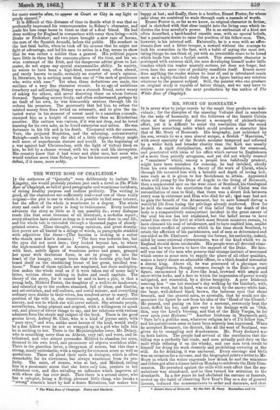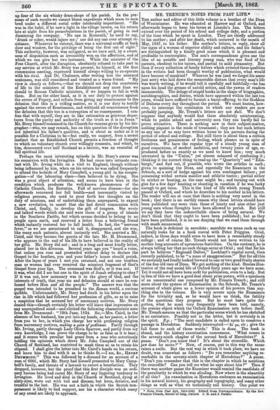MR. STORY OF ROSNEITH.*
IT is never wise to judge creeds by the result they produce on indi- viduals; for the disciples of the sneering Voltaire died in numbers for the sake of humanity, and the followers of the fanatic Calvin claim at the present day almost a monopoly of philanthropic effort, yet it is difficult to resist the conviction that the creed must have something noble which could produce a character like that of Mr. Story of Rosueath. His biography, just published by his son, reveals to us a man almost unique, a Scotch " Maurician," with every specialty of the Scotch minister tempered and softened by a wider faith and broader charity than the Kirk can usually display. I rigid disciplinarian, with an instinct for command, and penetrated with ideas of his office which savour to Englishmen of a more than priestly arrogance, and yet did not wholly conceal a "canniness" which, among a people less habitually prudent, might have been mistaken for cunning, he had imbibed, chiefly from his own meditations, a theory of the work of Christ, which through life invested him with a breadth and depth of loving holi- ness such as it is given to few Scotchmen to attain. Appointed when still young by the Duke of Argyle to the living of Rosneath, then a sequestered spot on the west coast of Scotland, his theological studies led him to the conviction that the work of Christ was the reconciliation of man to God; that there was a direct link between every man in existence and Him who died for all; tat man had not to gain the benefit of the Atonement, but to save himself daring a watchful life from losing the privilege already conferred. How far he held the essential corollary of this belief that the death of the body is a comparatively unimportant incident in the great career of the soul his son has not explained, but the belief seems to have raised him above the level at which most Scotch ministers remain, to have cleansed his soul of intolerance, and to have enabled him, amidst the violent conflict of systems which in his time shook Scotland, to retain the affection of his parishioners, and of men as determined and one-sided as Dr. Chalmers. Among the former, his authority, indeed, aided by some external circumstances, was of the kind which we in "Ingland should deem intolerable. His people were all devoted clans- men, and he was known to have the support of the Duke. He him- self was one of the men who possess that strange instinct of command which seems in some men to supply the place of all other qualities, makes a heavy dunce an admirable officer, or a thick-headed sensualist a decent king. Above all, he was possessed of a physique rare among Englishmen, though common enough in the East—a grand figure, surmounted by a Jove-like head, crowned with ample and snow-white locks, and a face in which the impression of power is only mitigated, not concealed, by a divine benignity. A poor Irishman meeting him "one hot summer's day walking by the Gairloch, with, as was his wont, hat in hand, was so struck by the snowy-white hair, the large, well-defined black brows, the lustrous eyes that shone beneath, and the general mien, so apostolic, that he could not dis- associate the figure he saw from his idea of the Head of the Church.' He paused, and gazing on him for a moment, reverently bent the knee, doffed his hat, and gave vent to his feelings with an Och, thin, may the Lord's blessing, and that of the Holy Vargin, be for ever upon your Boliness: " Another Irishman in Maynooth said, "Sure he's a godlike man, whatever religion he's of I'd follow him," and his parishioners seem to have been scarcely less impressed. When he accepted Rosireath, the district, like all the west of Scotland, was given up to smuggling and drunkenness. Mr. Story declared war on both habits. The people had arrived at the conclusion that dis- tilling was a perfectly fair trade, and men actually paid duty on the malt while refusing it on the whisky, and one man took credit ix> himself for doing his work decently and prohibiting swearing at the still. As for drinking, it was universal. Every marriage and birth was an occasion for a carouse, and the biographer paints a letter to Mr. Story in which the writer expounds how drunk he and the ministers and elders got after a dinner held on Monday to celebrate the Holy Com- munion. He preached against the stills with such effect that the ma- nufacture was abandoned, and he then turned his attention to the drunkards. In a few years he had abolished the carouse at funerals, rooted up the habit of observing New Year's Day as a day of general licence, reduced the communicants to order and decorum, and shut * Robert Story of Romeo& By the Bev. H. Story. Macmillan and Co.
up four of the six whisky dram-shops of his parish. In the pre- sence of such results we cannot blame expedients which seem to men bred under a different social order intolerably impertinent. "He was in the habit, if he saw a light in the village tavern, on his return late at night from his perambulations in the parish, of going in and dismissing the company. No one in Rosneath,' he used to say, 'drunk or sober, would injure me ;' nor did any one ever attempt re- sistance. Whenever he entered, there was a universal scuffle at hack door and window, for the privilege of being the first out of Sight." This authority, however, was mitigated, as we have said, by a sweet- ness of disposition such as irresistibly won on the affections, and of which we can give but two instances. While the minister of the Free Church, after the disruption, absolutely refused to take part in any service at which Mr. Story was present, he himself, at the first communion meeting, expressed himself always willing to co-operate with his rival. And Dr. Chalmers, after writing him the annexed sentences, was still considered and treated as a warm friend. "My view is clearly as follows,—that we should not drop the courtesies of life to the ministers of the Establishment any more than we should to Roman Catholic ministers, if we happen to fall in with them. But on the other hand, as it is our duty to protest against the errors of Popery, and refrain from giving any countenance to the i
delusion that this s a trifling matter, so it is our duty to testify against the errors of Erastiamsm, and withhold all countenance from the delusion that this too is a corruption of no consequence. I con- fess that with myself, they are in hie estimation as grievous depar- tures from the purity and authority of the truth as it is in Jesus." Mr. Story himself remained in the Church for reasons given by his bio- grapher—who, we may remark, has on this question of the disruption not inherited his father's qualities, and is about as unfair as it is possible for a Christian to be—but really, we suspect, from a secret instinct that an Established Church permits a freedom of thought to which no voluntary church ever willingly consents, and which, to him, denounced over half Scotland as a heretic, was an essential of full spiritual life.
Perhaps the most interesting episode in Mr. Story's career was his connexion with the Irvingites. He had come into intimate con- tact with Dr. Irving while on a visit to England, though without being influenced by him, when on his return he was called frequently to attend the bedside of Mary Campbell, a young girl in his congre- gation—of the labouring class—then believed to be dying: She was a great object of attention, and seems to have been in the condition which produces the well-known phenomenon of the Catholic Church, the Ecstatica. Full of nervous disease—for she afterwards recovered her full health—and incessantly visited by religious persons, she used to pour forth her thoughts on the duty of missions, and of undertaking them unprepared, to expect a new revelation, to assert that she had direct communion with Christ, and, finally, to develop the gift of tongues. She wrote and talked words which she said were those of a group of islands in the Southern Pacific, but which savans decided to belong to no people upon earth, and received a letter from a believing friend which instantly restored her to full health. In fact, the nervous fever," as we are accustomed to call it, disappeared, and she was, like many such patients, almost instantly well She married a Mr. Caird, and they became the guests of the late Mr. H. Drummond, who appears to the end of his life to have believed in the reality of her gifts. Mr. Story did not ; and in a long and most kindly letter, placed her in this dilemma. Several years ago you "heard a voice, that unless you rose and proceeded without delay to declare the Gospel to the heathen, you and your father's house should perish. Alter the lapse of years I met you returned, and not one heathen man or woman had ever received the minutest fragment of God's Gospel from your lips. The command was God's, or it was not.' If it was, what did I see but one in the spirit of Jonah refusing to obey? If it was not, how necessary was it to the glory of God, and the interests of truth, that your sin and delusion should at once be con- fessed before Him and all the people." The answer was that the gospel was intended to be preached to the Roman world, a curious quibble. Unfortunately, Mr. Story had dwelt in his letter upon the rise in life which had followed her profession of gifts, so as to raise a suspicion that he accused her of mercenary motives. Mr. Story denied this—though certainly his letter will leave that impression on any unprejudiced mind—and elicited the following characteristic note from Mr. Drummond: "19th June, 1834. Sir,—Mrs. Caird, in the absence of her husband, has put into my hands, as her pastor, a letter from you to her, in which you charge her with professing religion from mercenary motives, making' a gain of godliness. Partly through Mr. Irving, partly through Lady Olivia Sparrow, and partly from my own knowledge, I can prove the charge to be as false as it is base ; and it comes with peculiar bad grace from a man who notoriously holding the opinions which drove Mr. John Campbell out of the Church of Scotland, has contrived to mask them so as to retain his stipend. I shall give the letter into Mr. Caird's hands on his return, and leave him to deal with it as he thinks fit.—I am, &c., HENaz DRUMMOND." This was followed by a demand for an account of a sum of 600/., which Mr. Story had himself presented to Mary Camp- bell's family, and threats of a lawsuit to extort a benefaction. They dropped, however, but the proof that this first disciple was an ordi- nary human being had cured Mr. Story of any lingering tendency to Irvingism. He lived and died in the Church of Scotland, dying at sixty-nine, worn out with toil and disease, but keen, decisive, and trustful to the last. His was not a faith in which the Scotch tem- perament is likely to find support, nor his a character which many of any creed are likely to approach.































 Previous page
Previous page